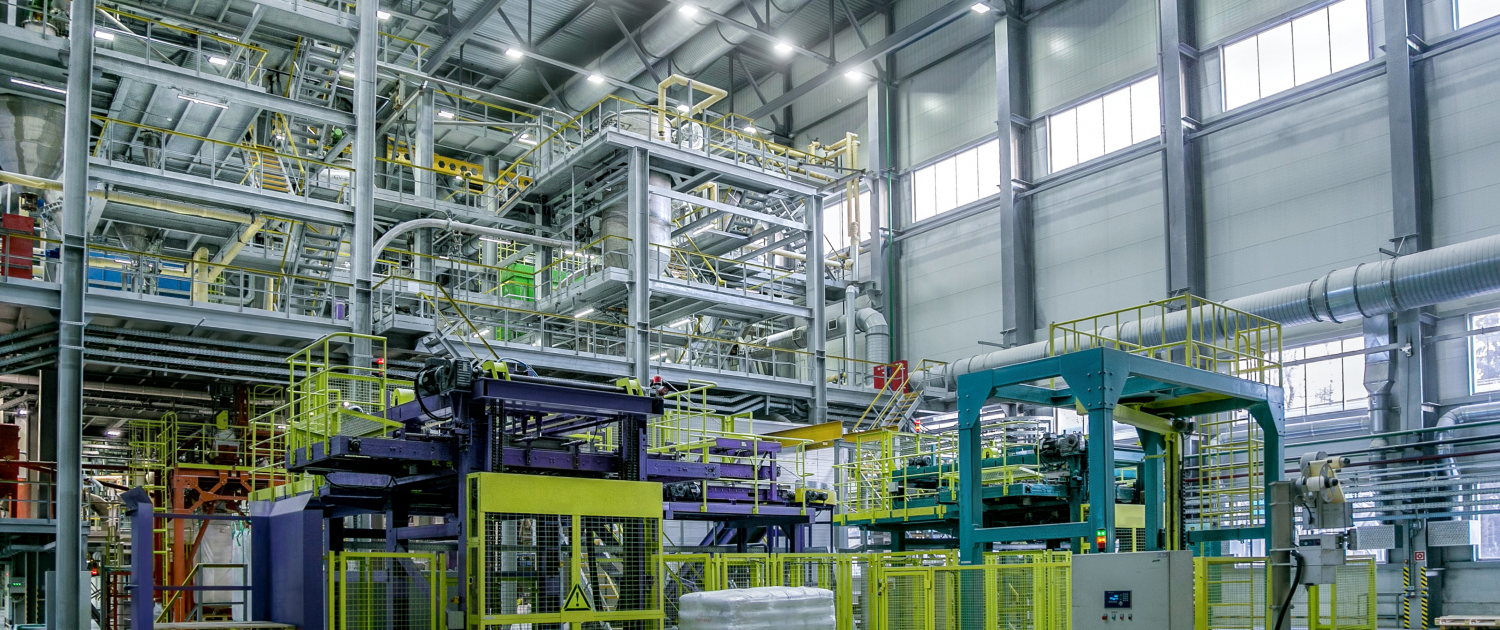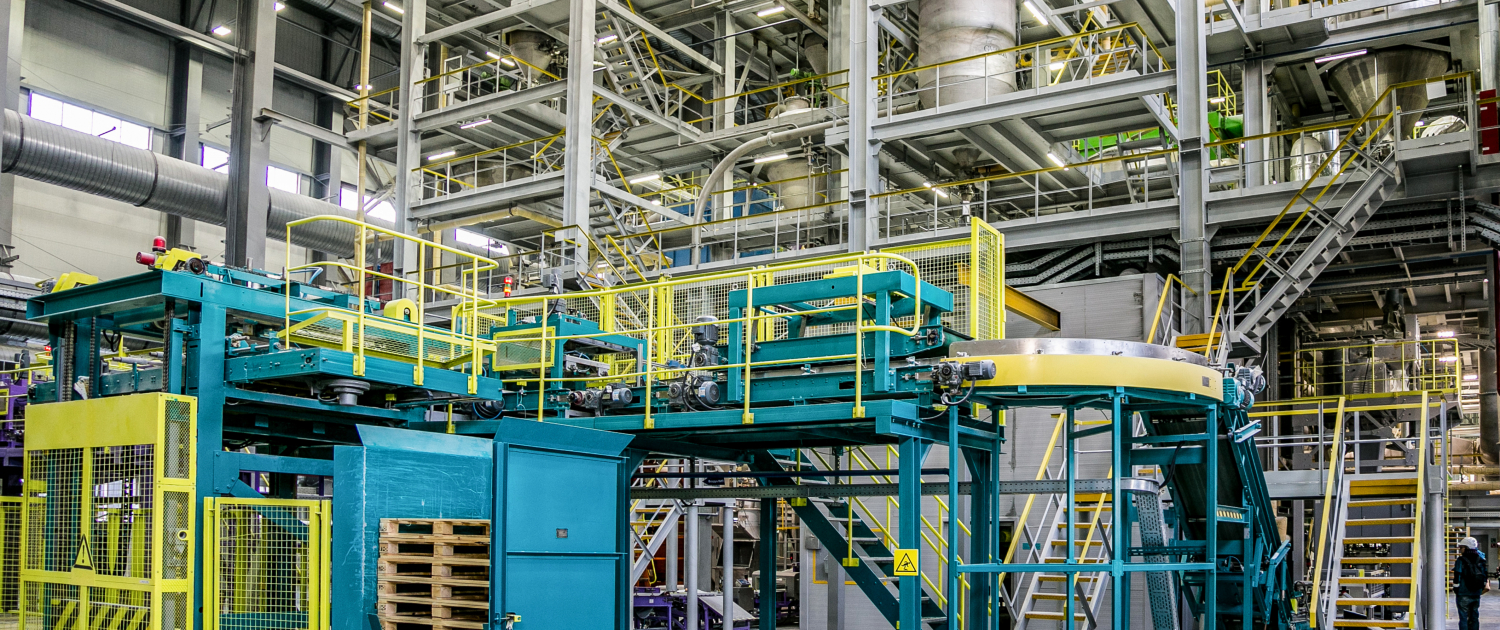Trichloroisocyanuric Acid (TCCA) Plant
Trichloroisocyanuric acid is an organic compound with the formula (C3Cl3N3O3). It is a new generation of high-efficiency broad-spectrum disinfectants, bleaches and anti-shrinkage agents. Mainly used for disinfection of drinking water, industrial circulating water, swimming pools, silkworm, restaurants, hotels, public places, homes and hospitals. Among them, the efficiency of bactericidal are much better than that Sodium hypochlorite. Currently, it’s a highest grade in the disinfectants industry. The product has strong oxide effect on almost all fungi, bacteria, viruses, spores, etc., with it lower cost, also safe and convenient to use. it widely used in food, dairy products, rice seed treatment, fruit preservation, and egg disinfection. also be used for fish disease control, fiber bleaching, wool shrinkage prevention, daily chemical bleaching, wood mildew, paper bleaching, rubber chlorination and battery materials….
Trichloroisocyanuric Acid (TCCA), dry appears as a white slightly hygroscopic crystalline powder or tablets with a mild chlorine-like odor. available chlorine >90%. Decomposes at 225°C. Moderately toxic by ingestion. May irritate skin and eyes. Active ingredient in household dry bleaches. Used in swimming pools as a disinfectant. It also can be used for sterilization. e.g; disinfection of the home, catering, drinking water and other public places with increase of consumption.
As of today, the Trichloroisocyanuric Acid (TCCA) plant built by Synopsis Chemitech were satisfied by the owners. the products exports to North America, South America and Europe were fully meets local standards.
Advantages of Synopsis Chemitech’s Technology
1. The modern factory creates a good working environment for customers (the working environment of traditional tunnel kiln process is terrible)
2. Significantly reduce the sublimation of Urea in the heating condensation process, to educe the losses of urea. No stickily issues in our process.
3. The ammonia gas output from our system has good stability. Ammonium sulfate (Agriculture grade) as by-products generated form Cyanuric acid plant to make great benefits for owners.
4. Diluted Sulfuric acid solution with concentration at 80% produced from existing chlorine gas drying system can be used as the raw material for the by-products of Ammonium sulfate.
5. The Urea consumption only at 1.65tons per ton of Cyanuric acid by our continuous technology, it much lower than tunnel kiln method (about 1.75 tons).
……
……for more information, please contact info@synopsischemitech.com
Trichloroisocyanuric Acid (TCCA) Process
The technologies of Trichloroisocyanuric acid plant provided by Synopsis Chemitech is an advanced “Multistage Countercurrent Type” continuous chlorination process with the lowest consumption of chlorine gas at less than 0.97 tons per ton of TCCA.
The technology of “Multistage Countercurrent Type” continuously chlorination Trichloroisocyanuric acid plant developed by Synopsis Chemitech aiming to the deficiency of “Two Stage Countercurrent Type” continuously chlorination system.
The key point of this technology is to replace the reaction system in stage 1 which consisting of water injector; circulating pump & chlorination reactor in the “Two Stage Countercurrent Process” by the Multistage dynamic absorption equipment.
In the new reaction process, Cl2 gas will be absorbed and reacted counter-currently by the alkali medium with gradually enhanced in the system, the advantage as following:
1. Ensure there are no Cl2 gas contained with exhaust gas discharge from the stage 1 reaction process.
2. Able to handle low concentration of Cl2 tail gas from mother liquor treatment system.
……for more information, please contact info@synopsischemitech.com
Principle of Trichloroisocyanuric Acid Production by Synopsis Chemitech
1. Reaction of Salt Formation:
C3N3O3H3 + 3NaOH → Na3(CNO)3 + 3H2O
2. Reaction of Chlorination:
Na3(CNO)3 + 3Cl2 → Cl3(CNO)3+ 3NaCl
3. Decomposition of Trisodium Cyanurate (Side Reaction):
Na3(CNO)3 + 6Cl2 + 3 H2O → 3NaCl + 3NCl3+ 3CO2+ 3H2
4. Decomposition of Nitrogen Trichloride (Alkali Catalysis):
3NCl3 → 3Cl2 + N2
Cyanuric Acid Plant
Cyanuric acid (Formula: C3H3N3O3; Molar mass: 129.07 g/mol) is a structural analogue of melamine. Cyanuric acid is an FDA-accepted component of feed-grade biuret, a ruminant feed additive. It is also found in swimming pool water as the dissociation product of dichloroisocyanurates used for water disinfection. When used in drinking water for disinfection purposes, sodium dichloroisocyanurate is rapidly dechlorinated to cyanurate.
Cyanuric acid like many industrially useful chemicals, this triazine has many synonyms. These white, odorless solid finds use as a precursor or a component of bleaches, disinfectants, and herbicides
Cyanuric acid as a raw material for TCCA plant are important for the owners. Owner may choose either purchase it from thirty party or build Cyanuric acid plant by their own.
Synopsis Chemitech has developed new continuous process of Cyanuric acid plant based on “Continuous Solid Phase Method” and is the most advanced in the world compared to traditional “Tunnel Kiln Method”.
The new Cyanuric acid plant by “Continuous Solid Phase Method” also known as the Continuous production by external circulation method, the basic process of this technology is: Urea Re-granulation -> Condensation -> Crushes -> Refine. The Industrial applications were matured through our past project experiences.
Urea will be the main raw materials for the Cyanuric acid plant, the core factor of our continuous technology by external circulation method is to make complex formation from Urea and Cyanuric acid in the condensation process.
Advantages of Synopsis Chemitech’s Technology
1. The modern factory creates a good working environment for customers (the working environment of traditional tunnel kiln process is terrible)
2. Significantly reduce the sublimation of Urea in the heating condensation process, to reduce the losses of urea. No stickily issues in our process.
3. The ammonia gas output from our system has good stability. Ammonium sulfate (Agriculture grade) as by-products generated form Cyanuric acid plant to make great benefits for owners.
4. Diluted Sulfuric acid solution with concentration at 80% produced from existing chlorine gas drying system can be used as the raw material for the by-products of Ammonium sulfate.
5. The Urea consumption only at 1.65tons per ton of Cyanuric acid by our continuous technology, is much lower than tunnel kiln method (about 1.75 tons).
……for more information, please contact info@synopsischemitech.com
Principle of Cyanuric Acid Production by Synopsis Chemitech
1. Isocyanuric Acid Formed from Urea Pyrolysis Deamination:
(Main Reaction)
3CO(NH2)2 -∆→ C3N3O3H3 + 3NH3↑
2. Melamine Formed from Urea Pyrolysis (Deamination & Decarburization):
(Side Reaction)
6CO(NH2)2 -∆→ C3N3(NH2)3 + 3CO2↑ + 6NH3↑
3. Add water into Melamine under the reaction of Sulfuric acid to Formed Cyanuric Acid and Ammonia:
C3N3(NH2)3 + 3H20 -H2SO4→ C3N3O3H3 + 3NH3↑
4. Ammonium Sulfate Formed from Absorption of Ammonia-containing tail gas by Sulfuric Acid:
2NH3 + H2SO4 → (NH4)2SO4
……for more information, please contact info@synopsischemitech.com
Sodium Dichloroisocyanurate (SDIC) Plant
Sodium Dichloroisocyanurate (SDIC) (Molecular formula: C3O3N3Cl2Na; Molecular weight: 219.95) produces hypochlorous acid when it is hydrolysed. It has the advantages of high efficiency, rapidity, safety, low toxicity and long effective time for sterilization and algae disinfection. It is an ideal replacement for disinfectant and is widely used in water. The effect of sterilization and algae removal in oilfield water.
In the past ten years, some of the developed countries have used this product by increased 6% per year. It is widely used as milk products, food processing equipment, tableware, public swimming pool disinfection, and also as a “4-in-1” detergent additive in washing powders. E.g Adding 0.3-0.5% Sodium Dichloroisocyanurate can remove bacteria and viruses on clothes in few minute times, including HIV, which is very suitable for medicine, restaurants, hotels, and also for pre-treatment of agricultural seeds, animal husbandry grassland pest control, silkworm disinfection, fruit preservation, feed mould, wool shrinkage, paper bleaching, rubber chlorination and printing and dyeing auxiliaries.
The plant built by Synopsis Chemitech for Sodium dichloroisocyanurate dihydrate mainly includes “Direct Method” and “Indirect Method”.
Direct method: Use Cyanuric Acid (Trisodium cyanurate solution) as raw material and direct chlorination in the formation of sodium dichloroisocyanurate and it will become Sodium Dichloroisocyanurate Dishydrate through crystallization, filtration with various processes.
The “Direct Method” process is simple,
However, a small amount of the sodium chloride produced in the chlorination process will be entrained in the products. Therefore, a special washing process become necessary for the removal of sodium chloride, due to the higher solubility of Sodium Dichloroisocyanurate Dihydrate (25%, 25°C), it results in too much wastewater being generated, and few amount of products will be dissolved into the mother liquor to affect the output of production rate.
In case without washing process, then the quality of the products will be affected by the sodium chloride contained in the SDIC.
Indirect method: Use Trichloroisocyanuric acid (TCCA) and Trisodium cyanurate solution to form the Sodium Dichloroisocyanurate, 3 mol Sodium Dichloroisocyanurate Dihydrate formed by the reaction of 2mol trichloroisocyanuric acid with 1mol trisodium cyanurate in aqueous solution.
The Sodium Dichloroisocyanurate Dihydrate produced from this method does not contain sodium chloride, therefore high-quality products can be produced without washing process.
The process of Sodium Dichloroisocyanurate Dihydrate plant by Indirect method will be complicated, generally it will not be recommend for the production of Sodium Dichloroisocyanurate Dihydrate if it works independently. However, if the Sodium Dichloroisocyanuric Dihydrate plant works synchronized with the Trichloroisocyanuric Acid plant then the total processes & operation costs for Sodium Dichloroisocyanuric Dihydrate will be reduced significantly.
Therefore, the Indirect method process will be better when both Trichloroisocyanuric Acid plant and Sodium Dichloroisocyanuric Dihydrate plant works synchronized.
……
……for more information, please contact info@synopsischemitech.com
Principle of Sodium Dichloroisocyanurate Production by Synopsis Chemitech
1. Reaction of Salt Formation:
C3N3O3H3 + 3 NaOH → Na3(CNO)3 + 3H2O
2. Reaction of Metathesis:
Na3(CNO)3 + 2 Cl3(CNO)3 + 6H2O → 3 C3O3N3Cl2Na·2H2O
TCCA Mother Liquor Treatments Technology
The process of TCCA mother liquor treatment system provided by Synopsis Chemitech are based on our advanced resin adsorption with chemical oxidation technology which can be deeply treated the TCCA mother liquor completely.
The technology of treatment system developed by Synopsis Chemitech are mainly for the mother liquor of Trichloroisocyanuric acid. The main components of mother liquor are the dissolved trichloroisocyanuric acid; sodium dichloroisocyanurate and NaCl.
The treatment method as follows:
Step 1: Will be the acidification process. Which is to add the hydrochloric acid into mother liquor in order to aid decomposition of trichloroisocyanuric acid and sodium dichloroisocyanurate to cyanuric acid, Cl2 gas and NaCl for recovery.
Step 2: Dechlorination; Neutralization; Cooling & Precipitation; cyanuric acid generated as solid type can be separated and recovered from the TCCA mother liquor. Cl2 gas then overflows from the mother liquor and it will be returned to the production system of trichloroisocyanuric acid. the mother liquor become colorless and odorless after treatment and COD will be less that 350mg/l.
This reaction can be carried out under room temperature, also can be improved the reaction speed by increase of temperature, which is conducive for the recovery of Cl2 precipitated in the reaction process. Due to the low solubility of cyanuric acid in water, cyanuric acid in the mother liquor precipitates out in the crystalline state after acidification and can be recovered by solid-liquid separation.
Step 3: …
Step 4: …
…
for more information, please contact info@synopsischemitech.com
The removal rate of organic matters such as cyanuric acid by resin adsorption process up to 99%. Some small amount of ammonium salts in free state may not yet removed. In order to ensure that the treated mother liquor can be return recycle to the salt saturator of existing Chlor-alkali plant, the mother liquor will have to deeply oxidized with sodium hypochlorite to reduce the total ammonium to less than 10mg/l.
Client may choose to convert the treated 10% brine solution to solid salts in-case unbalance water system in existing Chlor-alkali plant.
The quality report as below table:
| Recycled Brine / Salts Quality Report | |||||
| Series No. | Recycled Brine Solution | Recycled Solid Salts (Wet) | |||
| 1 | NaCl | 10% w/w | NaCl | 95-97% w/w
(H2O: 3-5%) |
|
| 2 | Total Ammonium | Guarantee: <10ppm Normal operating: ≤4-5ppm | Total Ammonium | Guarantee: <5ppm Normal operating: ≤5ppm | |
| 3 | TOC | <10ppm | TOC | <5ppm (Based on wet salts) | |
| 4 | Ca2+ | Not detectable | Ca2+ | Not detectable | |
| 5 | Mg2+ | Not detectable | Mg2+ | Not detectable | |
| 6 | Heavy metal content | Not detectable | Heavy metal content | Not detectable | |
……for more information, please contact info@synopsischemitech.com
Principle of TCCA Mother Liquor Treatment by Synopsis Chemitech
1. Acidolysis
TCCA + 3HCL → CA + 3Cl2
2. Dechlorination by Chemistry
Na2SO3 + NaClO → Na2SO4 + NaCl
3. Adsorption
Resin + CA → Resin·CA
4. Desorption
Resin·CA + 3NaOH → Na3(CNO)3 + Resin
5. Oxidation
2CA + 9NaOCl → 3N2 + 6CO2 + 9NaCl + 3H2O
……
……for more information, please contact info@synopsischemitech.com
Process Description:
- Description of CA production process;
- Description of TCCA production process;
- Description of SDIC Production Process;
- Preparation of Trisodium Cyanuric Acid Salt;
- TCCA Synthesis;
- Description of TCCA Mother Liquor Treatment Process;
……for more information, please contact info@synopsischemitech.com





